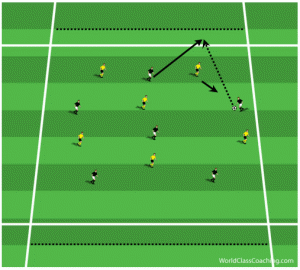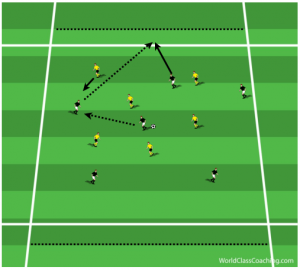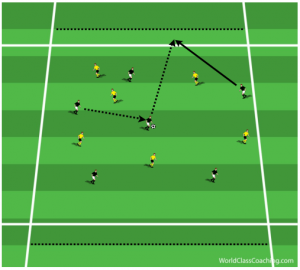By Sean Pearson
Area Size: 40 x 45 Yards
Teams: 6 v 6
Time: 20 Minutes
Objectives
- To understand when and where to run behind the defense
- When and where to time the through pass into space
- Use the correct weight of passThe area is split into three zones, two end zones of 5 yards in depth and a larger middle zone. All players start in the middle zone. The aim is to play a through ball into an end zone and be met by another player on your team.Have both teams set up in a 2-3-1 formation this gives natural triangles and diamonds within the formation and can relate to both the 4-2-3-1 and (European) 4-3-3 formation. There are off sides in the game from the beginning as you want to create as much realism as possible. First instruct the wide midfielders to supply the through ball to the striker, this is most effective when the defender on that side steps towards the ball. The wide midfielder aims to weight their pass so the striker can receive the ball inside the end zone. The striker makes a diagonal run behind the near defender and away from the furthest defender to give them the best chance at receiving the ball first.
If the defenders try to over compensate and stop the ball behind them have the striker move more to a position inside the further defender. This allows a larger gap to play the pass in front of the near defender.
Next, coach the center midfielder to spot when there is a gap between the two defenders, with a wide midfielder high and wide. The wide midfielder must also be able to see the opportunity to for the center midfielder to play the ball through the gap. The wide midfielder runs diagonally behind the defender because the defender will be focused on the ball and lose sight of the player.
Coaching Points
- Timing of runs behind the defenders into the space behind them
- Timing of pass into the space
- Direction and weight of pass
Variations/Progressions
- Add goals to score into
- Allow defenders into the end zones aiming to intercept the ball
- Take out the end zones
By Sean Pearson. Sean is also the author Coaching Team Shape in the 3-3-1, Coaching Team Shape in the 4-2-3-1 and Coaching Team Shape in the 4-3-3





